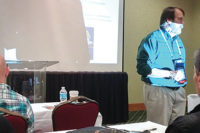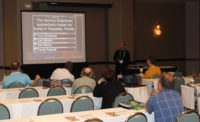In 1994, HVAC Excellence was formed to grow and prosper the next generation of HVAC service technicians through a regimented technician certification program. After 20 years, the group recently issued its 200,000th certification, surpassing its initial purpose while also growing and expanding into a diverse resource for HVAC professionals.
“The actual process of HVAC certification is an aid in identifying the scope and level of a technician’s retained knowledge and competency,” said Thomas Tebbe, national programs director, HVAC Excellence. “HVAC Excellence offers programs for students, experienced technicians, and educators that are designed to educate throughout each stage of their careers. Through progressive levels of certification, HVAC Excellence identifies if individuals have mastered a subject area or need additional training at a specific stage in their careers.”
HVAC Excellence currently offers more than 70 technician certifications, earned through a variety of written exams and hands-on certifications.
“We are really trying to offer something in every possible category,” said Howard Weiss, executive vice president, HVAC Excellence. “Our most popular certifications are formed with the basic fundamentals of the industry. The stuff that translates between the residential and commercial aspects of the industry draws the most attention. Specialty tests are also very important and popular. System performance is our most popular specialty test, while combustion analysis is also in high demand.”
While focused on helping technicians hone their trade, Tebbe said the organization learned early on that solely addressing certifications was not the answer to all the industry’s ills. “We needed to grow and find a way to solve more problems. So, we started looking at trends in the industry and decided we also wanted to address the quality of education within HVAC trade schools, which led to programmatic accreditation. Our ability to set instructional standards is a great step forward for the industry’s future.”
Expanding the Organization
While the industry is constantly advancing, HVAC Excellence has strived to follow suit.
“The accreditations have been where the real growth has come from in the industry in recent years,” said Tebbe. “We issued our first accreditation in 1999 in Tennessee. It is crazy to think HVAC was one of the biggest industries in the world, yet, had no real certification or accreditation programs up to that point. It makes a huge difference when a program holds some form of accreditation.”
However, there were a good number of challenges for HVAC Excellence as it attempted to become a respected third-party resource for colleges, universities, and the industry at large.
“Generally speaking, the manufacturing sector took a while to use us [HVAC Excellence] as a standard because it had some of its own programs in place,” said Tebbe. “But, the quality of our programs, the education we provide, and the expertise of our people shined. The educational community came along quickly with what we were doing. We want everyone who goes through our programs to have a quality education and a bright future in an industry in need of prospects.”
For Tom Kleinman, principal instructor of construction sciences and building technology, Dunwoody College of Technology, Minneapolis, technician certification validates a prospect has a minimum amount of field experience and possesses a reasonable amount of knowledge. Additionally, technician certification gives a prospective employer a foundation to use when making a hiring decision. It also gives the technician negotiating leverage as to his or her worth and potential.”
Through its accreditation process, Weiss said the organization has made it a priority to help schools build advisory boards and recruit students, which he calls the quickest way to spread the word about the industry’s wants and needs.
“Visiting high schools and going to job fairs are great ways to share interest in the industry, but everyone needs to talk to neighbors and those around them. Everyone in the HVAC industry should unite around recruiting the next generation of technicians. We can empower them.”
Staying Current and Recognizing Trends
The science of the industry must always be at the forefront of the profession, said Tebbe.
“Traditional HVACR programs are changing,” said Tebbe. “Residential air conditioning, heating, and light-commercial refrigeration programs should always be the backbone of curriculum as new technologies come to be. However, the makeup of programs must change. Utilizing adjunct professors and multiple instructors is one way to go, or keeping the curriculum as is and offering new technologies as exploratory programs at night is another route worth consideration. These options allow people in the industry to utilize supplemental training.
“Everyone in the field always wishes they could go back and hit the books,” continued Tebbe. “We want students to be as efficient as possible.”
Still, Tebbe recognizes that emerging trends are an important aspect of the industry.
“Renewable energy is a very real trend,” said Tebbe. “Green curriculum has never been clearly defined, and it needs to be. At HVAC Excellence, we’re telling all of the schools we evaluate they must contribute to self-studies on the subject. We want instructors to incorporate green technologies into programs, but we can’t just keep adding new technologies into these programs whenever we want. Programs would just get too long, and we need to keep the attention of young people trying to learn their craft. A good program has always been around 1,300 hours in length. So, we must make sure time is set aside to allow instructors to go to professional development courses. Instructors must be proficient before teaching new technologies to their students.”
Kleinman said HVAC Excellence grants him a feedback loop to processes, outcomes, core values, and a progression to higher quality education. “Our educational delivery is improved by being accountable to not just our stakeholders, but to the industry itself. HVAC Excellence accreditation gives us a tool by which we can improve. Basically, it shines a light on the areas you may have a deficit in, and enhances the areas you do well in.”
SIDEBAR: Programmatic Accreditation
HVAC Excellence defines programmatic accreditation as an independent third-party review of an educational program. The process validates that established standards of excellence for HVACR educational programs are met. These standards are designed to assure that the industry’s future workforce receives the quality of training required to provide the skills necessary for success. Accreditation standards require a thorough examination of each program’s mission, administrational responsibilities, finances and funds, student services, instruction design and program elements, physical facilities, equipment and tools, cooperative training, and instructor qualifications.
Publication date: 1/12/2015
Want more HVAC industry news and information? Join The NEWS on Facebook, Twitter, and LinkedIn today!










